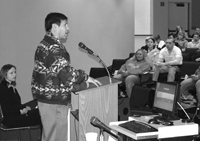 About:
About:
Although it is still true that some of the poorest communities in the U.S. are tribal communities, in the past several decades numerous American Indian tribes across the country have been developing extremely successful commercial and entrepreneurial enterprises. This economic growth is related, although by no means completely due, to changes in how sovereign nations are treated by the federal and state governments.
In a continually changing and complex legal environment, there is value in examining and assessing the current state of Native American commercial and economic activity, the varying degrees of success, and its legal and social connections. This seminar focused on Native American economic development and sovereignty in Nebraska, as well as discussing the legal environment, perspectives, success stories, and challenges to further tribal economic development in Nebraska.
This event was co-sponsored by the University of Nebraska-Lincoln College of Arts and Sciences, the University of Nebraska Public Policy Center, Wayne State College American Democracy Project, and Wayne State College Multicultural Center.
Moderator:
Connie R. Bear King, an enrolled member of the Standing Rock Sioux Tribe, is executive director of the Sioux City Office of Indian Education in Sioux City, Iowa. As director of the Indian Education Office, Ms. Bear King oversees a nonprofit organization that provides services to meet the special educational needs of American Indian students attending public schools in Sioux City.
In addition to directing the Sioux City Office of Indian Education, Ms. Bear King serves in a variety of national, regional, state, and community leadership positions. Ms. Bear King was elected to the board of the National Association for Community Mediators. By appointment of Iowa Governor Thomas Vilsack, with confirmation by the Iowa Senate, Ms. Bear King serves on the nine-member Child Advocacy Board (CAB). The CAB oversees The Court Appointed Special Advocates (CASA) and the Iowa Citizen Foster Care Review Board (ICFCRB) programs. Her committee memberships include the Steering Committee for the Community Initiative for Native Children and Families in Sioux City; the Administration for Children-Region VII Permanency meetings. She also serves as vice president and member of the Board of Directors of the Native Family Resource Center in Sioux City.
Panelists:
Judi M. Gaiashkibos is the executive director of the Nebraska Commission on Indian Affairs. She is a member of the Ponca Tribe of Nebraska. She has served as the executive director of the Commission for the past eight years. Prior to that, she worked for the Ponca Tribe as their NAGPRA specialist, office manager, and interim cultural director over a two-year period. Ms. Gaiashkibos has a bachelor’s degree in Human Relations from Doane College in Lincoln, Nebraska.
W. Don Nelson is the Nebraska state director for Senator Ben Nelson. He previously served as a chief policy officer for Bob Kerrey, J. James Exon, and Norbert Tiemann. Prior to his current public service, Mr. Nelson was an investment banker for 13 years and has participated in a wide range of financings ranging from $50,000.00 to $340 million. He has experience with both tax-exempt and taxable financing for public and corporate climates. He has an MS from the University of Florida and a JD from Florida State University.
John Blackhawk is the chairman of the Winnebago Tribe of Nebraska and is a member of the Thunder Clan. He has served the Winnebago Tribe since the fall of 1985, serving seven consecutive terms. During his 15 plus years, he has served as the chairman for 11 years beginning in 1988 at the age of 32.
During his terms in office, major accomplishments he has had direct involvement in is the construction of a replacement hospital in Winnebago (a 12-year battle), and the creation of a separate branch of government charged with economic development. The current branch, known as Ho-Chunk Inc., has received national awards and honors for its progressive revenue-generating models in Indian country. Other accomplishments during his tenure are the WinnAVegas Casino, whose revenues provided the necessary capital for the development of Ho-Chunk Inc., the Ho-Chunk Renaissance Language Program, the Whirling Thunder Wellness Center (who also received national recognition through the Harvard Innovations in American Government Award), and various buildings and land improvements that complement the community and its members.
Danelle Smith is an attorney and currently serves as general counsel for the Winnebago Tribe of Nebraska and for Ho-Chunk, Inc., the Tribe’s economic development corporation. She is a member of the Winnebago Tribe. Danelle serves on the Board of Directors for the Nebraska Justice Center and for the Legal Aid of Nebraska. She is also a member of the Nebraska State Bar Association’s Volunteer Lawyers Project Committee. Prior to law school, Danelle worked for a number of years in Community Education and Financial Aid at Little Priest Tribal College and the Nebraska Indian Community College in Winnebago. She obtained her law degree from the University of Iowa, has a Bachelor of Science Degree in Business Administration from Wayne State College, and an Associate of Arts Degree from Nebraska Indian Community College.
Sally Johnson is the First Assistant United States Attorney, and the chief of the Civil Division, for the District of Nebraska. She has worked in the U.S. Attorney’s office in Nebraska since 1978 and served as a law clerk for a federal judge from 1977-78.
